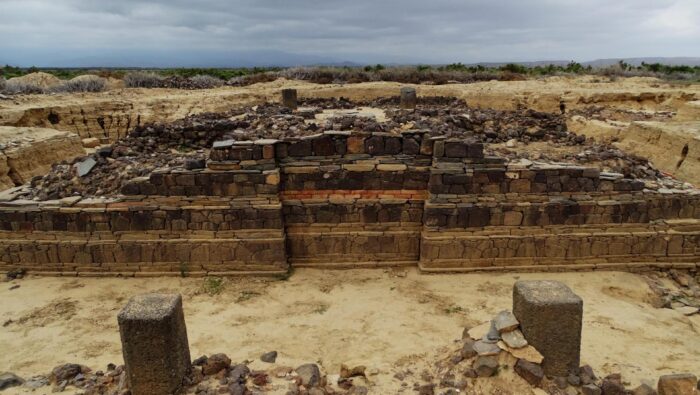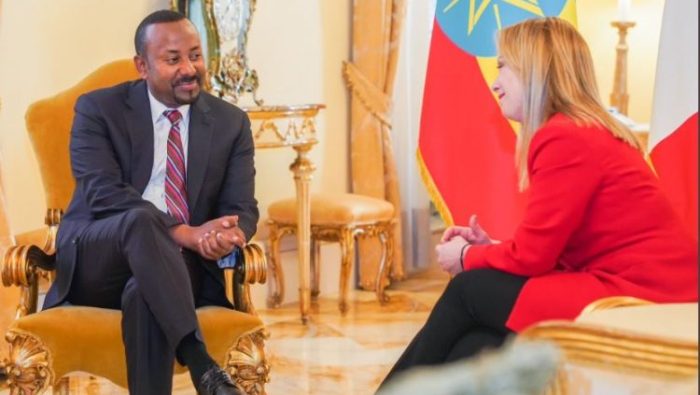Eritrea, why do people emigrate?


©Bruno Zanzottera (Parallelo Zero), Asmara un simbolo italiano, Fiat Tagliero, ex stazione di servizio
The Danish Immigration Service (DIS) published a report last November – Eritrea-Drivers and Root Causes of Emigration, National Service and Possibility of Return – about the situation in Eritrea and the reasons for the emigration of young people towards Europe, above all to Northern European Countries with developed welfare systems.
A job carried out on the field, based on interviews in Ethiopia (20/27 August) and Eritrea (1/17 October), which has been completely ignored by the Italian Press, which is usually attentive to relations.
Which sources have been used, who did the DIS spoke to and, above all, which internal situation does the report outline?
In Eritrea the DIS has gathered statements by officials of Western Embassies, of United Nations Agencies, of NGOs, of International Organizations, of a representative of a Western Embassy in Sudan – encountered in Asmara, of Eritrean intellectuals and, finally, the official statement of the Ministry for Foreign Affairs.
In Addis Abeba, Ethiopia, they have met the Danish Refugee Council (DRC), the International Organization of Migration (IOM), the Norwegian Refugee Council (NRC), the Director of InterAfricaGroup (IAG), the Swedish Embassy, the United Nations High Commissioner for Refugees (UNHCR) and its branch for the “Shire” program dedicated to the organization of camps.
In London the statement of Professor Gaim Kibreab, from South Bank University was taken – someone who has been away from his Country for a long time and who is openly hostile to the Government.
A long list of sources to understand a garbled situation.
It was not possible, according to the DIS, to get a balanced and impartial picture by only listening to asylum seekers and to stakeholders, or by limiting oneself to reporting accounts, which are too old dated to be judged as still relevant.
The report begins with an outline of the current situation: the Government is controlled by the President and by the one Party PFDJ, (People Front Democracy and Justice), the Country has been free since 1991, but without elections since 1993, the year when the National Assembly elected President Isaias Afwerki.
Notwithstanding these premises, which usually lead to the conclusion that tyranny is stifling the population, the atmosphere felt in the Country according to the DIS is calm, there is no perception of fear. The check-points are very few and informal, they do not block private traffic nor the circulation of buses, which travel through the Country always full of passengers, without being stopped at check points.
In the markets and shops there is no lack of goods and foodstuffs. In bars and hotels you can watch foreign channels, such as the BBC and CNN. People use cellphones and many young people crowd in hotel lobbies and internet points to connect to the internet.
In Asmara, in the evening, Caffè restaurants and pizza parlours are full of people, including many families. Many cars circulate, though service stations are sometimes closed and petrol must be bought on the black market.
Sometimes there is no electricity and water supply is scarce, awkward situations, which are still quite common in some African Countries, and perhaps for this reason they are patiently tolerated by the population.
If this is the situation, why do so many young people leave the Country to seek asylum in Northern Europe and America?
The roots of the problem stem from the last conflict with Ethiopia (1988-2000), the great neighbour, which America has so far wanted to hold the balance of power in the Horn of Africa.
In 1998, few years after the declaration of independence (1993) Ethiopia attacked Eritrea. In 2002 the “definitive and binding” Algiers Agreements established that the contended region, around the city of Badme, should be Eritrean, but Ethiopia did not abandon the occupied territories, forcing Eritrea to withdraw in a “no war – no peace” situation, which would become more oppressive in the years to come.
National military service, established after independence to rebuild a Country destroyed by thirty years of war (1961-1991) lasted 18 months up to that time, but was subsequently extended, as it became a major resource, causing profound discontent.
People who have fought for thirty years are willing to continue fighting, considering the Country’s interest a top priority, young people, however, want a better future and in order to have it they are ready to leave their Country, which is independent, but with an uncertain future.
Once free, Eritrea has decided to continue and do things by itself: “Self-Reliance” has become the rallying cry. The Country is small, without major richness and with a lot of poverty to be remedied, but within it there are no conflicts, a lay state allows Muslims and Christians to reciprocally participate in each others’ holidays and a strong national spirit tightly binds together nine different ethnic groups.
Today, as confirmed by the UNDP (United Nations Development Programme) Eritrea is among the Countries, which have reached important health objectives, established as Millennium Development Goals (MDGs) ahead of schedule, which are fundamental goals for its development.
Children are vaccinated, endemic diseases, such as malaria, have been eradicated, there is no AIDS and women do not die in childbirth, because even those who live in the most distant villages from the capital will find surgeries and midwives who help them during pregnancy and childbirth.
Food security is a hair’s breadth away. Equality between men and women has been achieved. Everyone goes to school for free – books, notebooks, pens are free and those who perform well go on to study at College and graduate.
The report proves this progress.
However, when the DIS asks the central question: « how do young men see National Military Service?» The unanimous answer can be summarized in one word: « bad ».
All sources claim that the compulsory National Military Service is the reason why young people leave the Country and seek asylum abroad. Not because it is a “cruel” service, but because it is too long and paid too little. In other words it has become an obstacle in recent years to young people’s life projects.
The route of entry to National Military Service, leads young men and women to attend the last year of secondary school in Sawa, where, before graduating, they spend some time studying and some time training – without using arms, because Sawa is not a military camp. You can be exempted on health grounds from training, not from Military Service.
At the end, those who have achieved high grades in the examination, will go on to study in one of the colleges outside Asmara, whereas the others will begin a training course and then start working.
National Military Service affects all, but in a different manner.
Those who are still studying can put it back until they graduate [from University], and will then carry out a type of National Service relating to their specific profession. Those training for a job start National Service immediately, which may lead them to work for a Ministry, in the Agriculture, Commerce or Tourism Sectors.
In practice you become employees of the state, but the problem is that the state pays you little.
The report says National Service pays 80 Nafka per month (a gratuity) at the beginning, 1.500 Nafka at the end. To give us an idea – continues the report – a gardener working for a Western embassy earns 3.500 Nafka a month, a hotel employee earns 3.000, a minister 4.000.
In Eritrea the private sector is only just beginning, the economy depends on the state, but the state – which needs its young people to grow and develop – pays them so little, why?
It is little only in relative terms, in other words the young people in the National Service are not the only poor in a rich society, even if they are much poorer than their relatives and friends, the so-called beles, who work abroad and come back to the homeland for the holidays.
Eritrea is a “class-less society”, without corruption, writes the report.
The President lives in a simple context, his children do not study abroad and the only privileges are granted to veterans of the thirty years’ war for independence and to the diaspora of people who might come back to the Country to invest.
National Service has so far been the cornerstone to create what was lacking – infrastructures, roads, bridges and, more recently, the crucial dam and the reservoirs to retain rainwater and improve agriculture in a Country with many arid zone.
Today, however, young people want choice, they want to direct their future.
Therefore, considering that it is not possible to make hic and nunc changes, it so happens that family groups organize the collection of money to pay for the expenses to send young people abroad, illegally, paving the way to the terrifying business of human trafficking, which we have come to know and which Eritrea has denounced on more than one occasion.
Of course, sanctions imposed by the UN in 2009 (1907) and in 2011 (2023) for accusations – never proved – that Eritrea helped the Somali fundamentalists of Al Shaabab affected and still affect the future of the Country.
Sanctions have stopped the development of the economy and have acted as a push factor for those who wanted to leave, if, as we read in the report, 99.9% of people leave for economic reasons.
The sources are concordant – only a minority flees for political reasons, almost all are economic migrants.
Another problem to do with National Service is its compulsory and “infinite” nature.
In actual fact, as you can read in the report, National Service is not infinite, but there is no clarity on its duration, which is currently between two to three years. A long time.
The report says that, for those who elude or desert, the gates of hell do not open.
The Country does not wish to ruin its own young nationals, so whoever has eluded National Service and applies to re-enter the Country, may do so by paying a 2% tax [on their income] and by signing a letter of apology.
The international press has bitterly criticized this tax, underlying its compulsory nature. The sources interviewed by the DIS explain its historical roots.
There are many Eritreans who live abroad, almost 50% of families have relatives outside the Country, a situation, which has reinforced a thick network of exchanges and help. This means that, by paying the 2% tax – born as a rehabilitation tax, it is possible to guarantee some extra services to the parents or children who remained in the homeland.
Some people may not like it, but for many others the statement I am an Eritrean, I am proud, matters and implies – in good and in bad fate.
Today, with the start of the “Karthoum Process” Eritrea is facing the problem of migrations and the tragedies of the deaths of those who, by illegally leaving the Country, become part of an organized business of crime.
The trip to Asmara last July of the Italian Deputy Minister for Foreign Affair Lapo Pistelli was crucial, as he started talks on migrations, which continued last November in Rome, in the presence of [representatives] of all Countries of the Horn of Africa and Countries of transit, including Lybia.
Eritreans illegally leaving the Country, as you can read in the report, are young and mostly male, though some females are also involved. They are not aware of the dangers of the trip, but their objective is not to remain in the refugee camps where they are accommodated, because they do not need to study or train for a job – things, which they have already done or could do in their homeland – they want to find a job.
Refugees, however, are not allowed to work for the Ethiopian Government, they may at most carry out small jobs for privates in the black, above all in the hotel sector.
All agree that the trafficking of people, taken also from refugee camps and then directed the next more profitable trade towards the West, must be stopped.
It is in Ethiopian refugee camps that young Eritreans meet the brokers, who will organize passage to Libya, via Sudan.
Every Eritrean national arriving safe and sound in Europe will have paid a huge sum to the organization, but will not accuse anyone, because his/her interest at that stage is to obtain asylum – political or humanitarian, to work and repay friends and family.
All sources mentioned in the report agree about the dangers of these terrible trips, many repeat that young men and women do not even imagine what is in store for them in Sinai and in Libya, before they are embarked on makeshift means, if all goes well, towards the coasts of the Mediterranean.
A NGO declares that it is wrong to label Eritrea as the “Northern Korea of Africa”, just as Sawa is not a rape and torture camp, where oppressed youths suffer hunger and become slaves. Also agencies for human rights, it writes, exaggerate.
The Eritrean Ministry for Foreign Affairs has confirmed the DIS that, whoever deserted or eluded National Service may re-enter the Country without complications by signing a letter of apology and by paying a two per cent fee.
Finally, the report has outlined the current Eritrean situation, establishing relations, providing elements and data to understand the connections between National Service and migration, between sanctions and poverty, between the objectives achieved and the desire for improved life conditions, between the no peace no war situation and international relations, between human rights and the right to peace. The DIS has not omitted criticism, nor covered falsity, a good job, a trustworthy report.
Marilena Dolce
@EritreaLive




Lascia un commento